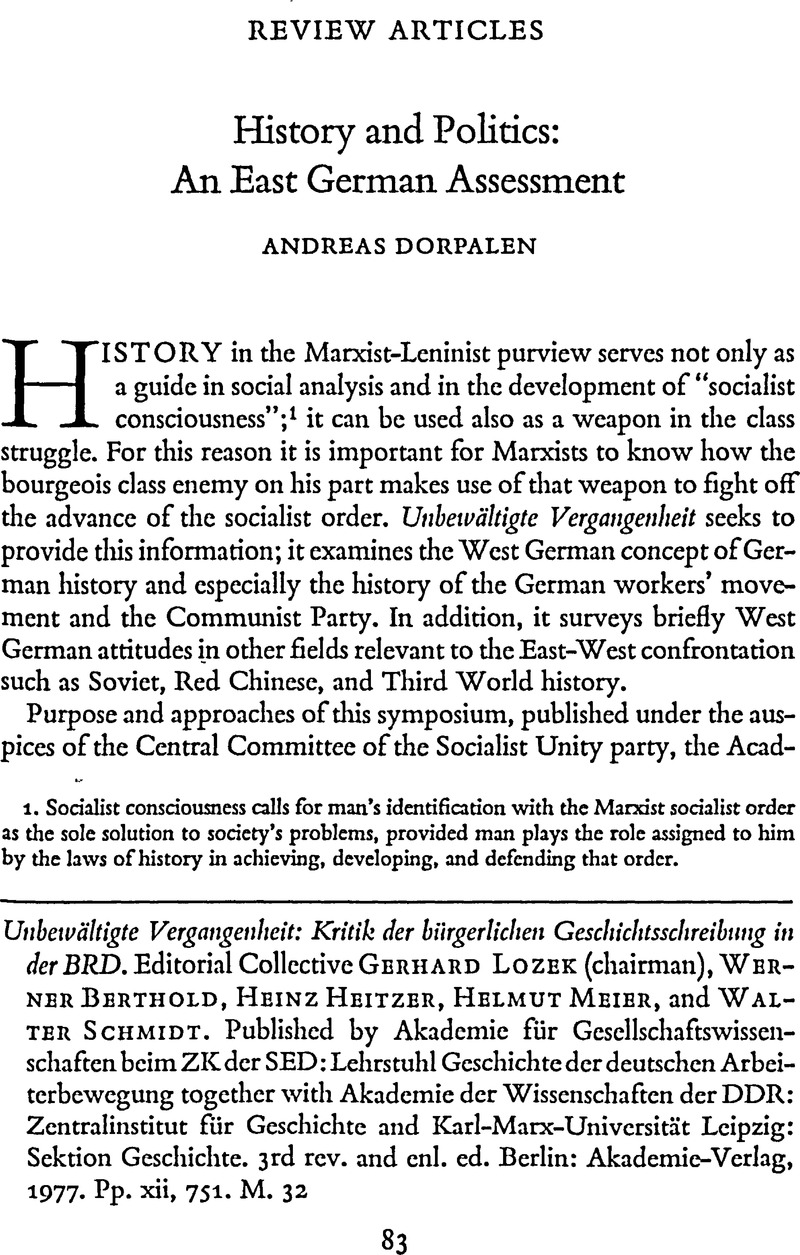No CrossRef data available.
Published online by Cambridge University Press: 16 December 2008

1 Socialist consciousness calls for man's identification with the Marxist socialist order as the sole solution to society's problems, provided man plays the role assigned to him by the laws of history in achieving, developing, and defending that order.
2 All page references in the text are to Unbewältigte Vergangenheit (cited as Unb. Verg.). A West German edition has been published as Kritik der bürgerlichen Geschichtsschreibung: Handbuch, ed. Werner, Berthold, Heinz, Heitzer, Gerhard, Lozek (chairman) et al., 4th rev. and enl. ed. (Cologne: Pahl-Rugenstein, 1977; pp. 751Google Scholar; DM 48).
3 Fritz Fischer is criticized, for example, for underestimating the antiimperialist and antimilitarist forces in imperial Germany: as a result he tends “somewhat to revalue upward the policy of Germany's imperialist opponents and to view them—expressly or not—as positive counterforces” (p. 309, also p. 313).
4 Some of the charges are based on clear misrepresentations of what was actually said. Compare Unb. Verg., p. 244, with Kotowski, Georg actual assessment of Prussian militarism in Preussen: Epochen und Probleme seiner Geschichte (Berlin [West], 1964), p. 146Google Scholar; Unb. Verg., p. 117, with what Hedwig Maier did write about the relationship between the SS and the anti-Nazi Resistance movement, Vierteljahrshefte für Zeitgeschichte (cited as VfZ) 14 (1966): 299ff.Google Scholar, esp. 315–16; Unb. Verg., p. 274, as against my evaluation of the attitude of the bourgeoisie in 1848, in Historische Zeitschrift 210 (1970): 335ff., esp. 338–39.
5 Compare Unb. Verg., p. 43, with the actual views of Shapiro, Leonard B., in Sowjetsystem und demokratische Gesellschaft (Freiburg, 1966–1972), 6: 467, 483, 486–87.Google Scholar Shapiro considers as totalitarian only the Soviet Union of the Stalin era. In a related context the views of Hans Mommsen, ibid., 4: 700–701, are summed up rather inaccurately, too; Unb. Verg., p. 45.
6 On the other hand, contrary to Ruge's claims, it does not follow from any of the books cited by him which I was able to check that the Communists must be considered mainly responsible for the collapse of the Weimar Republic.
7 Cf. the article on “Parteilichkeit,” in Sachwörterbuch der Geschichte Deutschlands und der deutschen Arbeiterbewegung (Berlin [East], 1969–70), 2: 255–56.
8 See, for example, the case I have discussed in Central European History 11 (1978): 214. The pages of Zeitschrift für Geschichtswissenschaft are filled with discussions concerning the consequences of various conclusions; see especially vols. 4 (1956) – 6 (1958), 10 (1962): 281–82, and n. 3 above.
9 Graml, Hermann, “Zur neuen Hitler-Biographie von Joachim C. Fest,” VfZ 22 (1974): 76ff., esp. 82ff.Google Scholar